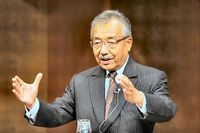


Toshio Matsuda, Commentator & Intl Economist
Straight from the Shoulder
Official Website : http://www.chokugen.com/e/
E-mail : masuda@sunraworld.com
FAX: 011 81 3 5965-0064
BackNumber is HERE!
By Looking Ahead and Acting First the US Continually Takes the Global Lead
The major players in today's global economy are the US, followed by Japan, Europe, China and the rest of Asia. The US in particular has the largest economic influence. That's not just because the US has the world's largest GDP (gross domestic product). Whether or not a country is the leading economic power depends on the country's ability to be "King of the Times".
After the Second World War, Japan and Europe, which had seen their industrial production facilities destroyed by the fighting, suffered from extremely serious shortages of goods and capital. At time, if you could just make something, you could certainly sell it. The US, a domestic nation that suffered no domestic war damage, was able to use its large reserves of capital and internationally advanced mass production systems to become the global supplier of goods and money in the blink of an eye, and thus gain the ascendancy in the global economy. After the war, new production facilities in Japan and West Germany, which were built with US capital, were more efficient and modern than the US's own facilities, and production capacity in the two countries began to catch up with the US. When US President Richard Nixon suddenly abandoned the gold standard on August 15, 1971, the production capacities of Japan and Germany were just about reaching a par with the US. In other words, the post-war era of excess demand where whatever could be made could be sold came to an end, and in its place the global economy suddenly entered a period of excess supply.
@This period also marked the start of international competition. President Nixon's declaration was also a declaration of America's transformation from a giant of manufacturing into a giant of consumption. The US government wanted to retain control over the global economy by changing policy, from being the leading supplier of goods in a time of deficit to becoming the leading consumer of goods in a time of excess. When President Ronald Reagan, who followed some years after President Nixon, put forward a policy of abandoning industrialism, it was an economic policy that anticipated the status of the "consumer as King" in times of excess supply. In later years, President Bill Clinton decided that in addition to becoming a consumer giant and abandoning industrialism, the US would also become a financial giant. 1991, following the collapse of the global economic bubble, was a time of restructuring. Global corporations contracted their size by shedding production capacity and labor. This brought about an era of surplus capital. The US government realized that whoever could control the rapidly increasing flow of excess capital would be able to control the global economy. Once again, the US was ahead of developments.
Japan and Asia (China) As Secondary Players If the US, which looks ahead and act as first, is the primary player in the global economy, then Japan and China are secondary players. That is because both the Japanese economy and Chinese economy are manufacturing-centered economies dependent on external demand. In an era of excess supply where the consumer is king, countries with manufacturing-based economies can never achieve economic control. China has the world's largest foreign currency reserves (over 100 trillion yen) and Japan has the second-largest reserves (approaching 100 trillion yen). However, a significant changes taking place in the world of money just as change took place in the world of goods. In other words, we are moving from an era of stockpiling funds to an era of using funds. That is part of a larger trend from holding assets to using and actively managing them. Money is now controlled by those who use it rather than those who hold onto it. This represents a change from a creditor's world to a debtor's world. Concurrent with this change, we are seeing a rapid rise in developed countries of legal provisions that are extremely strict on creditors and provide an excess degree of protection to debtors. In the world of finance too, debtors have taken over the king's throne.
The US is the largest purchaser of both Japanese and Chinese exports. And since both countries are also the US's two largest creditors, it is quite clear which country is 'king' of both Japan and China. Japan and China's political and economic management, which has failed to foresee future developments, has been clumsy. My father (who was a politician) swore by the motto "Ride the waves and swim well." This does not mean that we should accommodate anything or that we should yield to the powerful. Rather it means that politicians must stay abreast of contemporary trends.
Anyone wanting to redistribute Straight from the Shoulder pieces or excerpts from the texts should direct their request in advance to the Toshio Matsuda Office at Sunraworld, Ltd. (Tel: 81-(0)3-3955-2121).
BackNumber is Here!